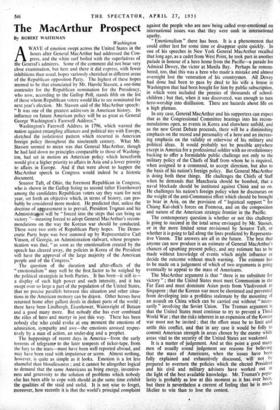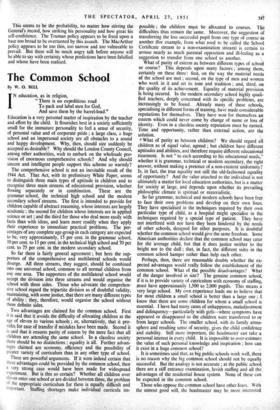The MacArthur Prospect
By ROBERT WAITHMAN Washington AWAVE of emotion swept across the United States in the hours after General MacArthur had addressed the Con- gress, and the white surf boiled with the superlatives of the General's admirers. Some of the comment did not bear very close examination, but here and there it did express, with fewer inhibitions than usual, hopes variously cherished in different areas of the Republican opposition Party. The highest of these hopes seemed to be that enunciated by Mr. Harold Stassen, a one-time contender for the Republican nomination for the Presidency, who now, according to the Gallup Poll, stands fifth on the list of those whom Republican voters would like to see nominated for next year's election. Mr. Stassen said of the MacArthur speech: " It was one of the greatest addresses in American history. Its influence on future American policy will be as great as General George Washington's Farewell Address." Washington's Farewell Address in 1796, which warned the nation against entangling alliances and political ties with Europe, sketched the isolationist pattern which recurred in American foreign policy throughout the nineteenth century. What Mr. Stassen seemed to mean was that General MacArthur, though he had laid down no principles comparable to those of Washing- ton, had set in motion an American policy which henceforth would give a higher priority to affairs in Asia and a lower priority to affairs in Europe. And if that were about to happen the MacArthur speech to Congress would indeed be a historic document.
Senator Taft, of Ohio, the foremost Republican in Congress, who is shown in the Gallup listing as second (after Eisenhower) among the candidates Republican voters say they want for next year, set forth an objective which, in terms of history, can pro- bably be considered more modest. He predicted that, unless the doctrine of apeasement is to prevail, President Trynan and his Administration will be " forced into the steps that can bring us victory "—meaning forced to adopt General MacArthur's recom- mendations on the way the Korean war should be conducted. These were two sorts of Republican Party hopes. The Demo- cratic Party hope was best summed up by Representative Carl Vinson, of Georgia, an Administration stalwart, whose prognos- tication was that, " as soon as the emotionalism created by the speech has cleared away, the policies in Korea of the President will have the approval of the large majority of the American people and of the Congress." The question of the duration and after-effects of the " emotionalism " may well be the first.factor to be weighed by the political strategists in both Parties. , It has been—it still is— a display of such high power and such intensity, and it has swept over so large a part of the population of the United States, that no precise parallels between this situation and other situa- tions in the American memory can be drawn. Other heroes have returned home after gallant deeds in distant parts of the world ; there have been Lindbergh, Eisenhower, Wainwright of Bataan and a good many more. But nobody else has ever combined the roles of hero and martyr in just this way. There has been nobody else who could evoke at one moment the emotions of admiration, sympathy and awe—the emotions aroused respec- tively by a man of action, an under-dog and a prophet.
The happenings of recent days in America—from the early torrents of telegrams, to the later tempests of ticker-tape, from the fury to the tears—must have been well reported abroad, and may have been read with impatience or scorn. Almost nothing, however, is quite as simple as it looks. Emotion is a lot less shameful than bloodlessness ; and it cannot be altogether logical to demand that the same Americans as bring energy, inventive- ness and generosity to the solution of problems which nobody else has been able to cope with should atthe same time exhibit the qualities of the staid and stolid. It is not wise to forget, moreover, how recently it is that the world's principal complaint against the people who are now being called over-emotional on international issues. was that they were sunk in international apathy.
` Emotionalism " there has been. It is a phenomenon that could either last for some time or disappear quite quickly. In one of his speeches in New York General MacArthur recalled that long ago, as a cadet from West Point, he took part in another paiade in honour of a hero home from the Pacific—a parade for Admiral Dewey, the victor at Manila Bay. Perhaps he remem- bered, too, that this was a hero who made'a mistake and almost overnight lost the veneration of his countrymen. All Dewey had done had been to pass by deed to his wife a house in Washington that had been bought for him by public subscription, in which were included the pennies of thousands of school- children ; but that, when it was discovered, was enough to turn hero-worship into disillusion. There are hazards about life on a high plateau.
In any case, General MacArthur and his supporters can expect that as the Congressional Committee hearings into his recom- mendations open, as events in.Korea and elsewhere unfold, and as the new Great Debate proceeds, there will be a diminishing emphasis on the record and personality of a hero and an increas- ing emphasis on the validity or otherwise of his military and political ideas. It would probably not be possible anywhere except in America for a professional soldier with no revolutionary backing to offer a formidable public challenge not only to the military policy of the Chiefs of Staff from whom he is required, when assigned to a command, to accept direction, but also to the basis of his nation's foreign policy. But General MacArthur is doing both these things. He challenges the Chiefs of Staff when he demands that Manchuria should be bombed, that a naval blockade should be instituted against Chilli and so on. He challenges his nation's foreign policy when he discourses on the weight of the anti-Communist effort which should be brought to bear in Asia, on the provision of " logistical support " for Chiang Kai-shek's forces on Formosa, and on the composition and nature of the American strategic frontier in the Pacific.
The contemporary question is whether or not this challenge is going to succeed in the total sense envisaged by Mr. Stassen, or in the more limited sense envisioned by Senator Taft, or whether it is going to fail along the lines predicted by Representa- tive Vinson. The answers are all in the future. The best that anyone can now produce is an estimate of General MacArthur's chances of upsetting present policy, and any estimate has to be made without knowledge of events which might influence or decide the outcome without much warning. The estimate has to be made on a judgement of which of two arguments is going eventually to appeal to the mass of Americans.
The MacArthur argument is that " there is no substitute for victory " ; that the United States must meet Communism in the Far East and must dominate Asian ports from Vladivostok to Singapore ; that the Korean war must be shortened and prevented from developing into a profitless stalemate by the mounting of an assault on China which can be carried out without " neces- sarily " involving the Soviet Union. The Truman argument is that the United States must continue to try to prevent a Third World War ; that the risks inherent in an expansion of the Korean war must not be invited ; that the effort must be to limit and settle this conflict, and that in any case it would be folly to commit American strength in areas chosen by the enemy while areas vital to the security of the United States are weakened. It is a matter of judgement. And at this point a good many men of usually sound judgement see reasons for believing that the mass of Americans, when the issues have been fully explained and exhaustively discussed, will not be prepared to overturn the policies which the elected Presided and his civil and military advisers have worked out in the light of the best available knowledge. Mr. Truman's popu- larity is probably as low at this moment as it has ever been• but there is nevertheless a current of feeling that be is much likelier to win than to lose the contest. This seems to be the probability, no matter how stirring the. General's record, how striking his personality and how great his self-confidence. The Truman policy appears to be fixed upon a base too broad to be overturned by this assault. The MacArthur policy appears to be too thin, too narrow and too vulnerable to prevail. But there will be much angry talk before anyone will be able to say with certainty whose predictions have been falsified and whose have been realised.



































 Previous page
Previous page